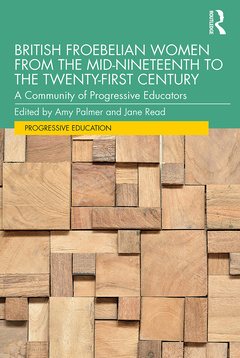British Froebelian Women from the Mid-Nineteenth to the Twenty-First Century A Community of Progressive Educators Progressive Education Series
Coordonnateurs : Palmer Amy, Read Jane

British Froebelian Women from the Mid-Nineteenth to the Twenty-First Century presents a series of critical case studies of individual women who worked and advocated for the cause of Froebelian and progressive pedagogy in Britain from the mid-nineteenth century until the present day. The book presents a compelling picture of how women have contributed in powerful ways to educational life and child-centred practices.
The book examines the beliefs and values of its subjects, offering crucial insights into how these women forged their professional identities and practice as new thinking about education and childhood emerged, and considers the differing forms of inspiration they drew from their connections with the Froebelian community.
This book will be of great interest for postgraduate students and academics in the fields of Women's Studies, History of Education, Early Childhood Education and Early Childhood Studies.
List of figures. List of contributors. Series editor introduction by Catherine Burke and Jane Martin. Foreword by Amy Palmer and Jane Read. Acknowledgements. Introduction. Identity and community, revision and dissemination: the evolving Froebel community in Britain. 1. Esther E. Lawrence (1862-1944). Defining and Redefining Froebelian Pedagogy at the Froebel Educational Institute, London. 2. Clara Grant (1867-1949). Implementing Froebelian Pedagogy in an East London Slum. 3.Grace Owen (1873-1965). Sharing and Fostering Froebelian Principles within the Nursery School Movement. 4. Jeanie P. Slight (1890–1973). Disseminating Revisionist Froebelian Pedagogy. 5. Enid Blyton (1897-1968). Articulating Froebelian Pedagogy through Literature for Children and Teachers. 6. Molly Brearley (1905-1994). Educating Teachers and Popularising Developmental Approaches in the Post-War Era. 7. Elinor Goldschmied (1910-2009). Pioneering Practice for People Under Three and Those Who Care for Them. 8. Chris Athey (1924 - 2011). Integrating Piagetian Principles into Froebelian Pedagogy. 9. Tina Bruce (b.1947). Advocating and Practising Froebelian Principles. Conclusion. Froebelian pedagogy yesterday, today and tomorrow. Appendix: timeline. Index.
Amy Palmer is Senior Lecturer in Early Childhood Studies at the University of Roehampton, London, UK, and Books Editor of History of Education.
Jane Read is Emeritus Fellow at the University of Roehampton, London, UK, and a member of the Early Childhood Research Centre.
Date de parution : 04-2022
15.6x23.4 cm
Date de parution : 07-2020
15.6x23.4 cm
Thème de British Froebelian Women from the Mid-Nineteenth to the... :
Mots-clés :
Froebel Educational Institute; Froebel College; Froebelian pedagogy; Froebelian Principles; Progressive education; Froebel Society; Feminist biography; Identity; Froebelian Training; Community; Froebelian Identity; Revision; Froebel’s Ideas; Women educators; British Froebelian; Dissemination; Froebelian Practice; Professional practice; Clara Grant; progressive pedagogy; Enid Blyton; individual women; Elinor Goldschmied; child-centred practices; Froebelian Teacher; Froebelian; Froebelian Tradition; Froebelian community; Froebel Trust; Key Person Approach; Early Childhood Education; Froebel Movement; Froebelian Institutions; Froebel’s Work; Nursery School; National Nursery Examination Board; Free Kindergarten; Infant School



